Ward A.W. The Cambridge History of British Foreign Policy. 1783-1919. Volume 3
Подождите немного. Документ загружается.

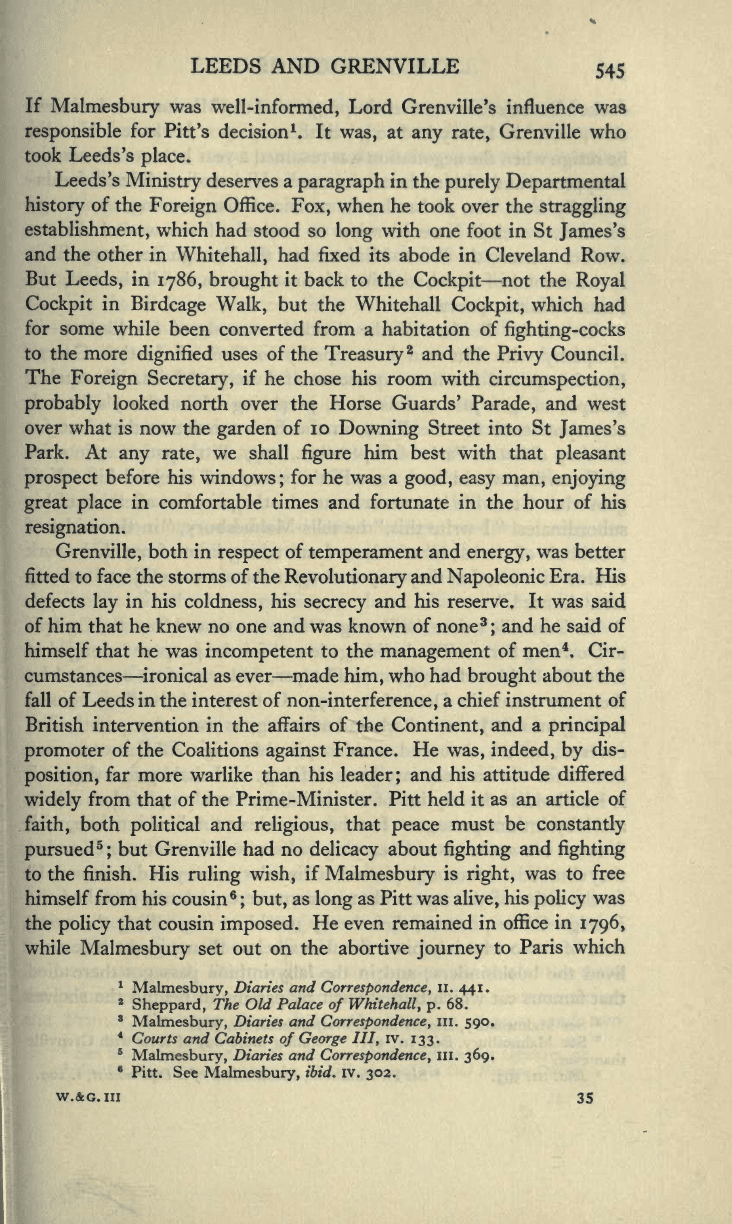
LEEDS AND
GRENVILLE
545
If
Malmesbury
was
well-informed,
Lord Grenville's influence
was
responsible
for
Pitt's
decision
1
.
It
was,
at
any
rate,
Grenville
who
took Leeds's
place.
Leeds's
Ministry
deserves a
paragraph
in
the
purely
Departmental
history
of
the
Foreign
Office.
Fox,
when he
took
over
the
straggling
establishment,
which had
stood
so
long
with one foot in St
James's
and
the
other
in
Whitehall,
had fixed
its abode in
Cleveland Row.
But
Leeds,
in
1786,
brought
it
back
to the
Cockpit
—
not the
Royal
Cockpit
in
Birdcage
Walk,
but the
Whitehall
Cockpit,
which had
for
some
while been
converted
from a
habitation of
fighting-cocks
to the more
dignified
uses
of
the
Treasury
2
and
the
Privy
Council.
The
Foreign
Secretary,
if
he
chose his room
with
circumspection,
probably
looked
north
over
the
Horse
Guards'
Parade,
and
west
over
what
is
now the
garden
of
10
Downing
Street
into
St
James's
Park.
At
any
rate,
we shall
figure
him
best
with that
pleasant
prospect
before his
windows;
for
he
was a
good,
easy
man,
enjoying
great place
in
comfortable
times and
fortunate
in
the
hour
of
his
resignation.
Grenville,
both
in
respect
of
temperament
and
energy,
was
better
fitted to face
the storms
of
the
Revolutionary
and
Napoleonic
Era.
His
defects
lay
in his
coldness,
his
secrecy
and
his
reserve. It
was said
of him
that
he knew no one and was known of none
3
;
and he said of
himself
that
he
was
incompetent
to the
management
of men
4
.
Cir-
cumstances
—
ironical as ever
—
made
him,
who had
brought
about the
fall
of Leeds
in
the interest
of
non-interference,
a chief instrument
of
British
intervention
in
the
affairs
of
the
Continent,
and a
principal
promoter
of the
Coalitions
against
France.
He
was,
indeed,
by
dis-
position,
far
more
warlike
than
his
leader;
and
his
attitude
differed
widely
from
that
of the Prime-Minister. Pitt
held
it
as
an article
of
faith,
both
political
and
religious,
that
peace
must
be
constantly
pursued
5
;
but
Grenville had
no
delicacy
about
fighting
and
fighting
to the
finish. His
ruling
wish,
if
Malmesbury
is
right,
was
to
free
himself from his
cousin
6
; but,
as
long
as
Pitt
was
alive,
his
policy
was
the
policy
that cousin
imposed.
He even remained
in office
in
1796,
while
Malmesbury
set out
on the abortive
journey
to
Paris
which
1
Malmesbury,
Diaries
and
Correspondence
,
n.
441.
2
Sheppard,
The Old Palace
of
Whitehall,
p.
68.
3
Malmesbury,
Diaries and
Correspondence,
ill.
590.
4
Courts and Cabinets
of
George
HI,
iv.
133.
5
Malmesbury,
Diaries and
Correspondence,
in.
369.
6
Pitt. See
Malmesbury,
ibid.
iv.
302.
w.&g.iii
35
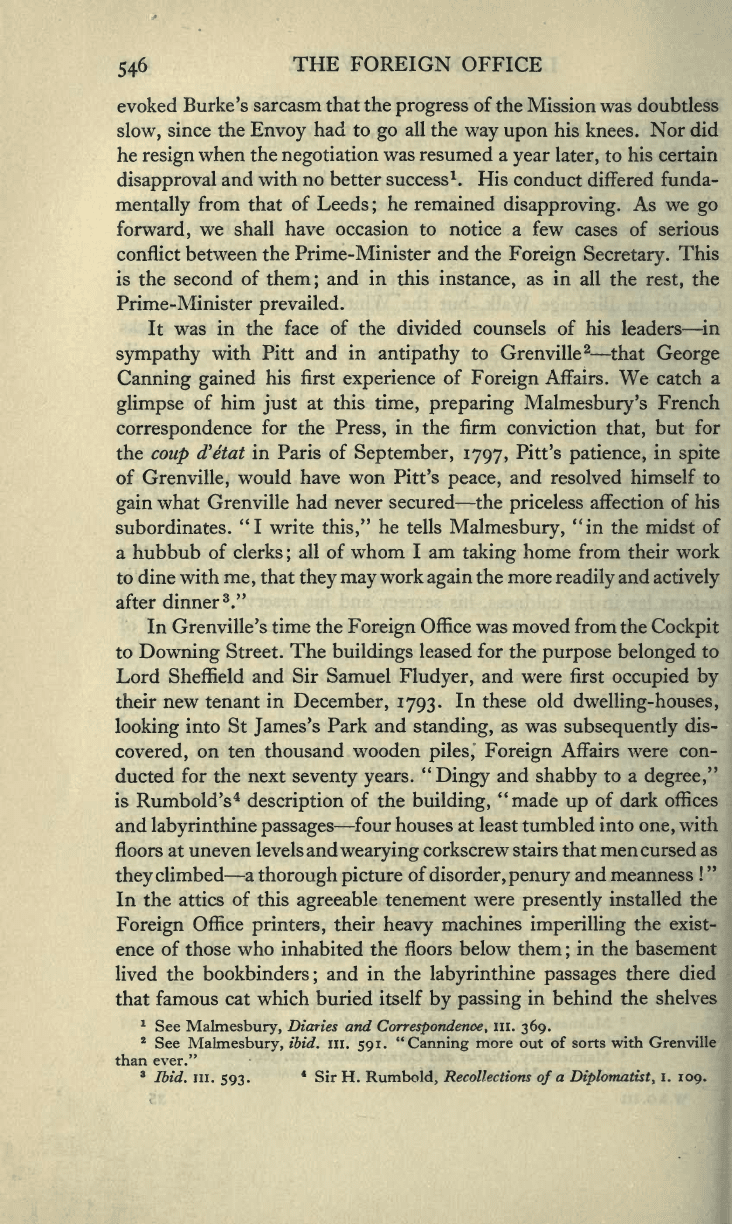
546
THE FOREIGN
OFFICE
evoked
Burke's
sarcasm that the
progress
of
the
Mission was doubtless
slow,
since the
Envoy
had
to
go
all
the
way upon
his knees.
Nor
did
he
resign
when the
negotiation
was
resumed a
year
later,
to
his
certain
disapproval
and
with
no better success
1
. His
conduct
differed
funda-
mentally
from
that
of Leeds
;
he remained
disapproving.
As
we
go
forward,
we
shall have occasion
to
notice
a few
cases
of
serious
conflict between the
Prime-Minister
and
the
Foreign
Secretary.
This
is
the
second
of
them;
and in
this
instance,
as
in
all
the
rest,
the
Prime-Minister
prevailed.
It
was in
the
face
of
the
divided counsels
of his leaders
—
in
sympathy
with Pitt
and
in
antipathy
to Grenville
2
—
that
George
Canning gained
his
first
experience
of
Foreign
Affairs.
We
catch
a
glimpse
of
him
just
at this
time,
preparing Malmesbury's
French
correspondence
for
the
Press,
in
the
firm
conviction
that,
but
for
the
coup
d'etat in Paris of
September,
1797,
Pitt's
patience,
in
spite
of
Grenville,
would have
won
Pitt's
peace,
and
resolved himself to
gain
what Grenville
had never
secured
—
the
priceless
affection
of his
subordinates.
"I
write
this,"
he
tells
Malmesbury,
"in
the midst
of
a hubbub of
clerks
;
all
of whom I am
taking
home
from
their
work
to
dine
with
me,
that
they may
work
again
the
more
readily
and
actively
after
dinner
3
."
In Grenville
's
time the
Foreign
Office
was
moved from
the
Cockpit
to
Downing
Street.
The
buildings
leased for
the
purpose belonged
to
Lord Sheffield
and
Sir Samuel
Fludyer,
and
were
first
occupied
by
their
new tenant
in
December,
1793.
In
these
old
dwelling-houses,
looking
into
St
James's
Park
and
standing,
as
was
subsequently
dis-
covered,
on
ten thousand
wooden
piles, Foreign
Affairs
were
con-
ducted
for
the
next
seventy
years. "Dingy
and
shabby
to
a
degree,"
is Rumbold's
4
description
of
the
building,
"made
up
of dark offices
and
labyrinthine
passages
—
four houses at least tumbled into
one,
with
floors at uneven
levels and
wearying
corkscrew
stairs that
men
cursed
as
they
climbed
—
a
thorough picture
of
disorder,
penury
and
meanness
!
"
In the attics
of
this
agreeable
tenement
were
presently
installed
the
Foreign
Office
printers,
their
heavy
machines
imperilling
the exist-
ence
of
those
who
inhabited the
floors below them
;
in the
basement
lived
the
bookbinders;
and
in the
labyrinthine
passages
there
died
that
famous
cat which
buried itself
by passing
in
behind the
shelves
1
See
Malmesbury,
Diaries and
Correspondence,
HI.
369.
2
See
Malmesbury,
ibid. in.
591.
"Canning
more
out
of sorts
with Grenville
than ever."
3
Ibid. in.
593.
*
Sir H.
Rumbold,
Recollections
of
a
Diplomatist,
1.
109.
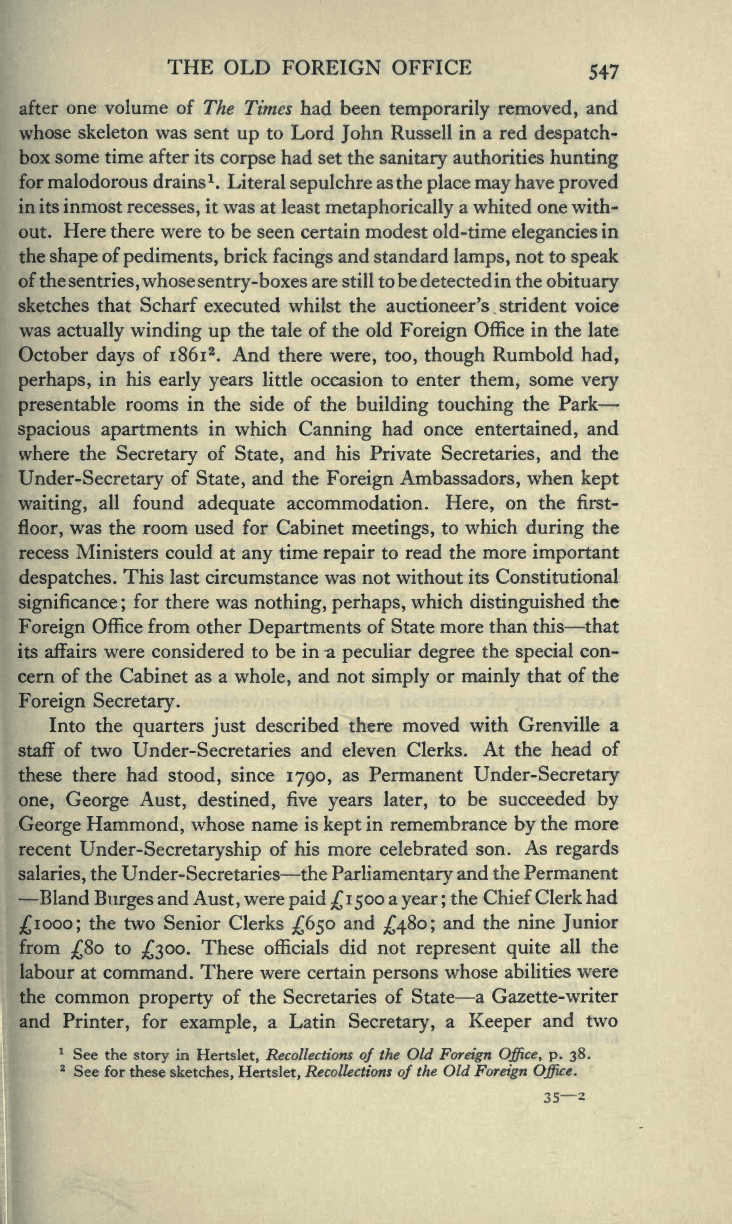
THE OLD
FOREIGN
OFFICE
547
after
one
volume of
The
Times had
been
temporarily
removed,
and
whose
skeleton was
sent
up
to
Lord
John
Russell
in a
red
despatch-
box
some time
after
its
corpse
had set the
sanitary
authorities
hunting
for
malodorous
drains
1
.
Literal
sepulchre
as
the
place may
have
proved
in
its
inmost
recesses,
it was
at least
metaphorically
a
whited
one with-
out.
Here
there were
to be seen
certain modest
old-time
elegancies
in
the
shape
of
pediments,
brick
facings
and
standard
lamps,
not
to
speak
of
the
sentries,
whose
sentry-boxes
are still
to
be
detected
in the
obituary
sketches that Scharf
executed
whilst the
auctioneer's
strident
voice
was
actually winding up
the tale of
the
old
Foreign
Office
in
the
late
October
days
of
1861
2
. And
there
were, too,
though
Rumbold
had,
perhaps,
in his
early years
little
occasion
to enter
them,
some
very
presentable
rooms in
the side of
the
building
touching
the
Park
—
spacious apartments
in which
Canning
had once
entertained,
and
where
the
Secretary
of
State,
and his
Private
Secretaries,
and
the
Under-Secretary
of
State,
and
the
Foreign
Ambassadors,
when
kept
waiting,
all found
adequate
accommodation.
Here,
on the
first-
floor,
was
the
room
used
for
Cabinet
meetings,
to
which
during
the
recess Ministers could
at
any
time
repair
to read the
more
important
despatches.
This
last
circumstance
was not
without
its Constitutional
significance
;
for
there was
nothing,
perhaps,
which
distinguished
the
Foreign
Office from
other
Departments
of
State
more
than
this
—
that
its
affairs were considered
to
be in a
peculiar
degree
the
special
con-
cern of the
Cabinet
as a
whole,
and
not
simply
or
mainly
that
of
the
Foreign Secretary.
Into
the
quarters
just
described there
moved with
Grenville
a
staff
of
two Under-Secretaries
and
eleven
Clerks. At the
head
of
these there
had
stood,
since
1790,
as
Permanent
Under-Secretary
one,
George
Aust, destined,
five
years
later,
to
be
succeeded
by
George
Hammond,
whose
name
is
kept
in remembrance
by
the
more
recent
Under-Secretaryship
of his more celebrated
son.
As
regards
salaries,
the
Under-Secretaries
—
the
Parliamentary
and
the Permanent
—
Bland
Burges
and
Aust,
were
paid
£1500
a
year
;
the
Chief Clerk
had
£1000;
the two
Senior Clerks
£650
and
£480;
and the
nine
Junior
from
£80
to
£300.
These
officials
did not
represent
quite
all the
labour
at command.
There
were certain
persons
whose
abilities
were
the common
property
of
the
Secretaries
of
State
—
a
Gazette-writer
and
Printer,
for
example,
a Latin
Secretary,
a
Keeper
and
two
1
See the
story
in
Hertslet,
Recollections
of
the Old
Foreign
Office, p. 38.
2
See for
these
sketches, Hertslet,
Recollections
of
the Old
Foreign
Office.
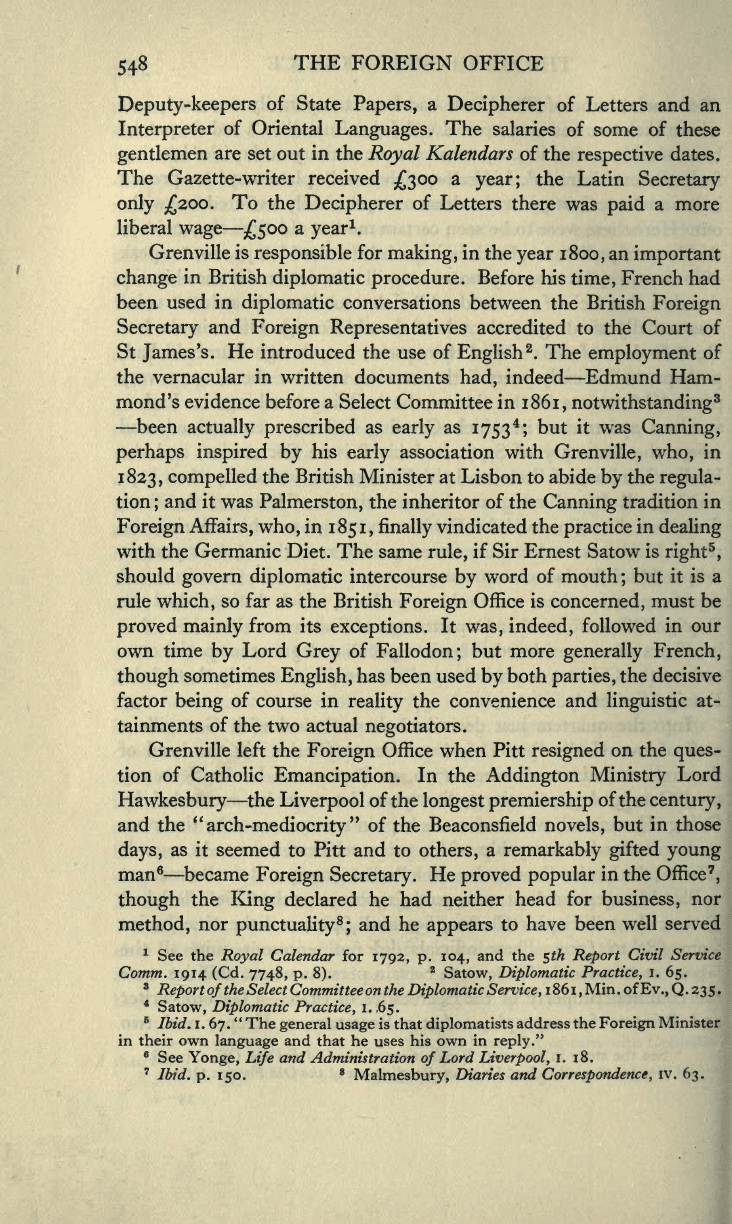
548
THE
FOREIGN
OFFICE
Deputy-keepers
of
State
Papers,
a
Decipherer
of
Letters
and
an
Interpreter
of
Oriental
Languages.
The
salaries
of some of
these
gentlemen
are
set out
in
the
Royal
Kalendars of
the
respective
dates.
The Gazette-writer received
£300
a
year;
the
Latin
Secretary
only
£200.
To
the
Decipherer
of
Letters
there was
paid
a more
liberal
wage
—
£500
a
year
1
.
Grenville
is
responsible
for
making,
in
the
year
1800,
an
important
change
in
British
diplomatic
procedure.
Before
his
time,
French
had
been
used
in
diplomatic
conversations between
the
British
Foreign
Secretary
and
Foreign Representatives
accredited to the Court
of
St
James's.
He
introduced the use of
English
2
.
The
employment
of
the vernacular
in
written documents
had,
indeed
—
Edmund Ham-
mond's
evidence
before
a
Select
Committee
in 1
861,
notwithstanding
3
—
been
actually prescribed
as
early
as
1753
4
;
but it
was
Canning,
perhaps
inspired
by
his
early
association with
Grenville, who,
in
1823, compelled
the British
Minister
at Lisbon
to
abide
by
the
regula-
tion
;
and
it
was
Palmerston,
the inheritor
of
the
Canning
tradition
in
Foreign
Affairs, who,
in
185
1,
finally
vindicated the
practice
in
dealing
with the
Germanic
Diet.
The same
rule,
if Sir Ernest Satow
is
right
5
,
should
govern diplomatic
intercourse
by
word
of
mouth
;
but
it
is a
rule
which,
so far as
the British
Foreign
Office
is
concerned,
must
be
proved
mainly
from
its
exceptions.
It
was, indeed,
followed
in
our
own
time
by
Lord
Grey
of
Fallodon;
but
more
generally
French,
though
sometimes
English,
has
been
used
by
both
parties,
the
decisive
factor
being
of
course
in
reality
the
convenience
and
linguistic
at-
tainments
of
the
two actual
negotiators.
Grenville
left the
Foreign
Office when
Pitt
resigned
on
the
ques-
tion
of
Catholic
Emancipation.
In
the
Addington
Ministry
Lord
Hawkesbury
—
the
Liverpool
of
the
longest
premiership
of
the
century,
and
the
"arch-mediocrity"
of
the
Beaconsfield
novels,
but
in
those
days,
as
it seemed
to Pitt
and
to
others,
a
remarkably gifted
young
man
6
—
became
Foreign Secretary.
He
proved
popular
in
the
Office
7
,
though
the
King
declared
he
had
neither
head
for
business,
nor
method,
nor
punctuality
8
;
and he
appears
to
have been
well
served
1
See the
Royal
Calendar for
1792, p.
104,
and
the
5th Report
Civil
Service
Comm.
1914
(Cd.
7748, p.
8).
2
Satow,
Diplomatic
Practice,
1.
65.
3
Report
of
the
Select
Committeeonthe
Diplomatic
Service,
i86i,Min.
ofEv.,0.235.
4
Satow,
Diplomatic
Practice,
1.65.
5
Ibid. 1.
67.
"
The
general
usage
is that
diplomatists
address the
Foreign
Minister
in
their own
language
and
that
he
uses
his
own in
reply."
6
See
Yonge, Life
and Administration
of
Lord
Liverpool,
I. 18.
7
Ibid.
p. 150.
8
Malmesbury,
Diaries and
Correspondence,
IV.
63.
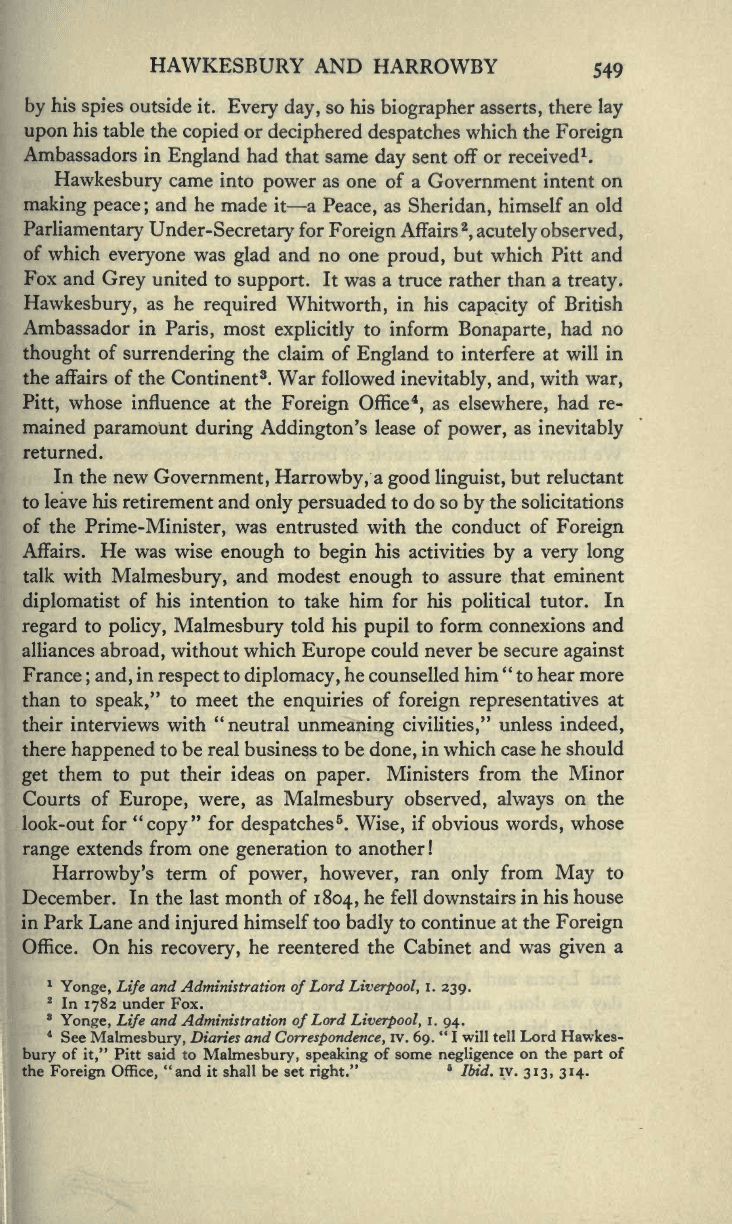
HAWKESBURY AND
HARROWBY
549
by
his
spies
outside
it.
Every day,
so his
biographer
asserts,
there
lay
upon
his
table
the
copied
or
deciphered
despatches
which
the
Foreign
Ambassadors in
England
had
that
same
day
sent
off
or
received
1
.
Hawkesbury
came
into
power
as
one of a
Government intent
on
making peace;
and
he
made
it
—
a
Peace,
as
Sheridan,
himself
an old
Parliamentary
Under-Secretary
for
Foreign
Affairs
2
,
acutely
observed,
of
which
everyone
was
glad
and
no one
proud,
but
which
Pitt
and
Fox and
Grey
united
to
support.
It
was a
truce
rather than
a
treaty.
Hawkesbury,
as
he
required
Whitworth,
in his
capacity
of
British
Ambassador
in
Paris,
most
explicitly
to
inform
Bonaparte,
had
no
thought
of
surrendering
the claim of
England
to interfere
at will
in
the
affairs
of
the
Continent
3
. War
followed
inevitably,
and,
with
war,
Pitt,
whose
influence at
the
Foreign
Office
4
,
as
elsewhere,
had
re-
mained
paramount
during Addington's
lease
of
power,
as
inevitably
returned.
In
the new
Government,
Harrowby,
a
good linguist,
but
reluctant
to
leave
his
retirement
and
only persuaded
to
do so
by
the solicitations
of
the
Prime-Minister,
was
entrusted
with
the
conduct
of
Foreign
Affairs. He
was wise
enough
to
begin
his
activities
by
a
very long
talk with
Malmesbury,
and
modest
enough
to
assure
that
eminent
diplomatist
of his
intention to take
him for his
political
tutor.
In
regard
to
policy,
Malmesbury
told
his
pupil
to
form connexions
and
alliances
abroad,
without
which
Europe
could
never
be secure
against
France
; and,
in
respect
to
diplomacy,
he counselled
him
"
to
hear
more
than to
speak,"
to
meet
the
enquiries
of
foreign
representatives
at
their interviews
with
"neutral
unmeaning
civilities,"
unless
indeed,
there
happened
to be
real business
to
be
done,
in which case
he should
get
them to
put
their
ideas on
paper.
Ministers
from
the
Minor
Courts
of
Europe,
were,
as
Malmesbury
observed,
always
on
the
look-out for
"copy"
for
despatches
5
.
Wise,
if
obvious
words,
whose
range
extends
from one
generation
to another
!
Harrowby's
term
of
power,
however,
ran
only
from
May
to
December.
In
the last
month of
1804,
he
fell
downstairs
in
his house
in
Park
Lane
and
injured
himself
too
badly
to continue at the
Foreign
Office.
On his
recovery,
he
reentered
the
Cabinet
and was
given
a
1
Yonge,
Life
and
Administration
of
Lord
Liverpool,
I.
239.
2
In
1782
under
Fox.
8
Yonge, Life
and Administration
of
Lord
Liverpool,
I.
94.
4
See
Malmesbury,
Diaries and
Correspondence,
IV.
69.
"
I
will tell Lord Hawkes-
bury
of
it,"
Pitt said to
Malmesbury, speaking
of some
negligence
on the
part
of
the
Foreign Office,
"and it shall be set
right."
6
Ibid.
iv.
313,
314.
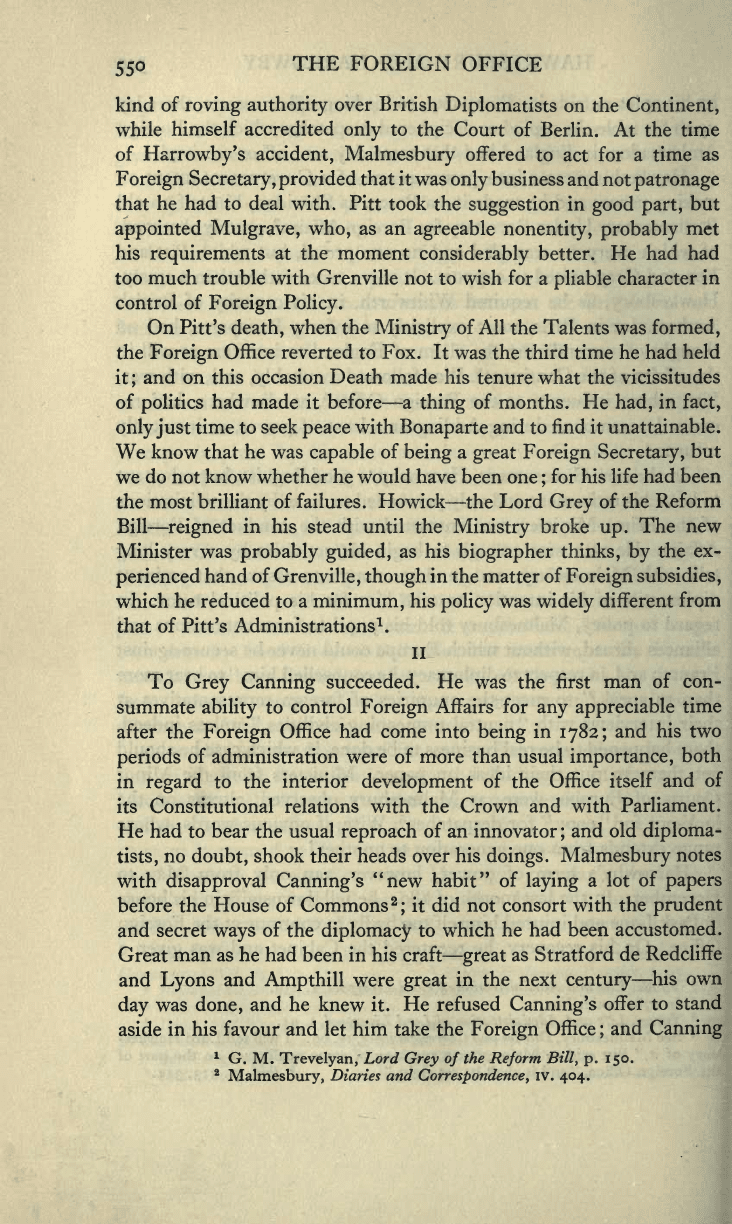
550
THE
FOREIGN
OFFICE
kind of
roving
authority
over British
Diplomatists
on
the
Continent,
while
himself accredited
only
to
the
Court of
Berlin. At the
time
of
Harrowby's
accident,
Malmesbury
offered
to
act
for a time
as
Foreign Secretary, provided
that
it
was
only
business
and
not
patronage
that
he had to deal with.
Pitt took the
suggestion
in
good
part,
but
appointed
Mulgrave,
who,
as an
agreeable
nonentity, probably
met
his
requirements
at
the
moment
considerably
better.
He
had
had
too
much
trouble
with Grenville
not to wish for
a
pliable
character
in
control of
Foreign Policy.
On Pitt's
death,
when the
Ministry
of All
the Talents was
formed,
the
Foreign
Office
reverted
to Fox.
It was the
third time
he
had held
it
;
and on
this
occasion
Death made
his
tenure what the
vicissitudes
of
politics
had made
it
before
—
a
thing
of
months. He
had,
in
fact,
only just
time
to
seek
peace
with
Bonaparte
and to
find
it unattainable.
We
know
that
he was
capable
of
being
a
great Foreign
Secretary,
but
we
do
not know whether
he would
have been one
;
for his life
had
been
the most brilliant
of
failures. Howick
—
the
Lord
Grey
of
the
Reform
Bill
—
reigned
in
his stead
until
the
Ministry
broke
up.
The
new
Minister
was
probably guided,
as his
biographer
thinks,
by
the
ex-
perienced
hand
of
Grenville,
though
in
the
matter
of
Foreign
subsidies,
which
he reduced
to
a
minimum,
his
policy
was
widely
different
from
that
of
Pitt's
Administrations
1
.
II
To
Grey
Canning
succeeded. He was
the
first
man
of con-
summate
ability
to
control
Foreign
Affairs for
any
appreciable
time
after
the
Foreign
Office
had come
into
being
in
1782;
and
his
two
periods
of administration
were of more than
usual
importance,
both
in
regard
to the
interior
development
of
the
Office itself
and
of
its Constitutional
relations with the
Crown and
with
Parliament.
He
had
to
bear
the
usual
reproach
of an innovator
;
and
old
diploma-
tists,
no
doubt,
shook
their
heads
over
his
doings.
Malmesbury
notes
with
disapproval
Canning's
"new habit"
of
laying
a
lot
of
papers
before
the House
of Commons
2
;
it
did not consort with
the
prudent
and
secret
ways
of
the
diplomacy
to
which
he had been
accustomed.
Great
man as
he
had
been
in his
craft
—
great
as Stratford
de
Redcliffe
and
Lyons
and
Ampthill
were
great
in
the next
century
—
his
own
day
was
done,
and he knew
it.
He refused
Canning's
offer to
stand
aside
in
his
favour
and
let
him
take the
Foreign
Office
;
and
Canning
1
G. M.
Trevelyan,
Lord
Grey of
the
Reform
Bill,
p. 150.
2
Malmesbury,
Diaries and
Correspondence,
iv.
404.
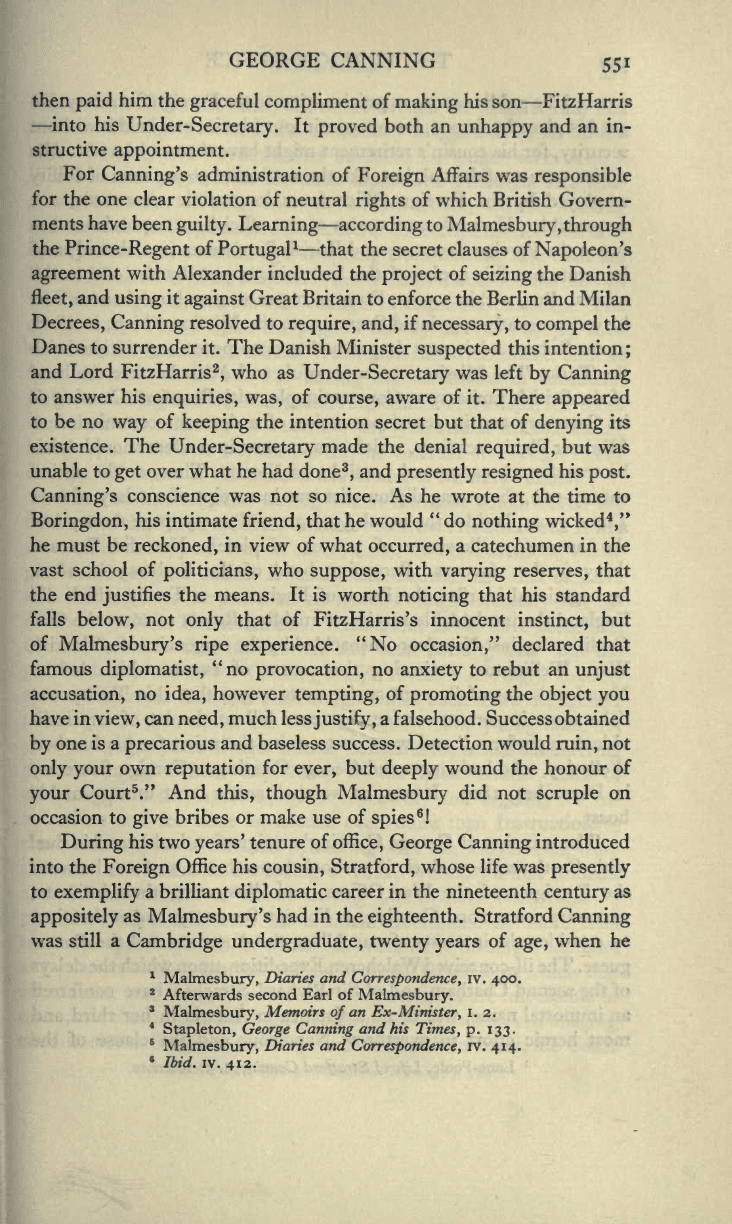
GEORGE
CANNING
551
then
paid
him
the
graceful
compliment
of
making
his son
—
FitzHarris
—
into
his
Under-Secretary.
It
proved
both
an
unhappy
and an
in-
structive
appointment.
For
Canning's
administration
of
Foreign
Affairs
was
responsible
for the
one
clear
violation
of
neutral
rights
of which
British Govern-
ments
have
been
guilty.
Learning
—
according
to
Malmesbury,through
the
Prince-Regent
of
Portugal
1
—
that the
secret clauses of
Napoleon's
agreement
with Alexander
included
the
project
of
seizing
the
Danish
fleet,
and
using
it
against
Great Britain
to
enforce
the
Berlin and Milan
Decrees,
Canning
resolved
to
require,
and,
if
necessary,
to
compel
the
Danes
to
surrender
it.
The
Danish
Minister
suspected
this intention
;
and Lord
FitzHarris
2
,
who
as
Under-Secretary
was
left
by
Canning
to
answer his
enquiries,
was,
of
course,
aware of
it.
There
appeared
to
be
no
way
of
keeping
the
intention
secret but
that
of
denying
its
existence. The
Under-Secretary
made the denial
required,
but
was
unable
to
get
over
what
he had
done
3
,
and
presently resigned
his
post.
Canning's
conscience
was
not
so
nice. As he
wrote at
the
time to
Boringdon,
his
intimate
friend,
that
he
would
"
do
nothing
wicked
4
,"
he
must
be
reckoned,
in view of
what
occurred,
a
catechumen
in
the
vast
school of
politicians,
who
suppose,
with
varying
reserves,
that
the
end
justifies
the
means.
It
is
worth
noticing
that
his
standard
falls
below,
not
only
that
of
FitzHarris's innocent
instinct,
but
of
Malmesbury's ripe experience.
"No
occasion,"
declared that
famous
diplomatist,
"no
provocation,
no
anxiety
to
rebut
an
unjust
accusation,
no
idea,
however
tempting,
of
promoting
the
object you
have
in
view,
can
need,
much
less
justify,
a falsehood. Success
obtained
by
one is a
precarious
and baseless
success.
Detection
would
ruin,
not
only your
own
reputation
for
ever,
but
deeply
wound
the
honour of
your
Court
5
." And
this,
though
Malmesbury
did
not
scruple
on
occasion to
give
bribes
or make use of
spies
6
!
During
his
two
years'
tenure
of
office,
George Canning
introduced
into
the
Foreign
Office his
cousin, Stratford,
whose life was
presently
to
exemplify
a brilliant
diplomatic
career
in
the
nineteenth
century
as
appositely
as
Malmesbury's
had in
the
eighteenth.
Stratford
Canning
was
still
a
Cambridge undergraduate, twenty
years
of
age,
when he
1
Malmesbury,
Diaries and
Correspondence,
iv.
400.
2
Afterwards second
Earl of
Malmesbury.
3
Malmesbury,
Memoirs
of
an
Ex-Minister
,
1.
2.
4
Stapleton, George
Canning
and
his
Times,
p. 133.
5
Malmesbury,
Diaries
and
Correspondence,
IV.
414.
6
Ibid. iv.
412.
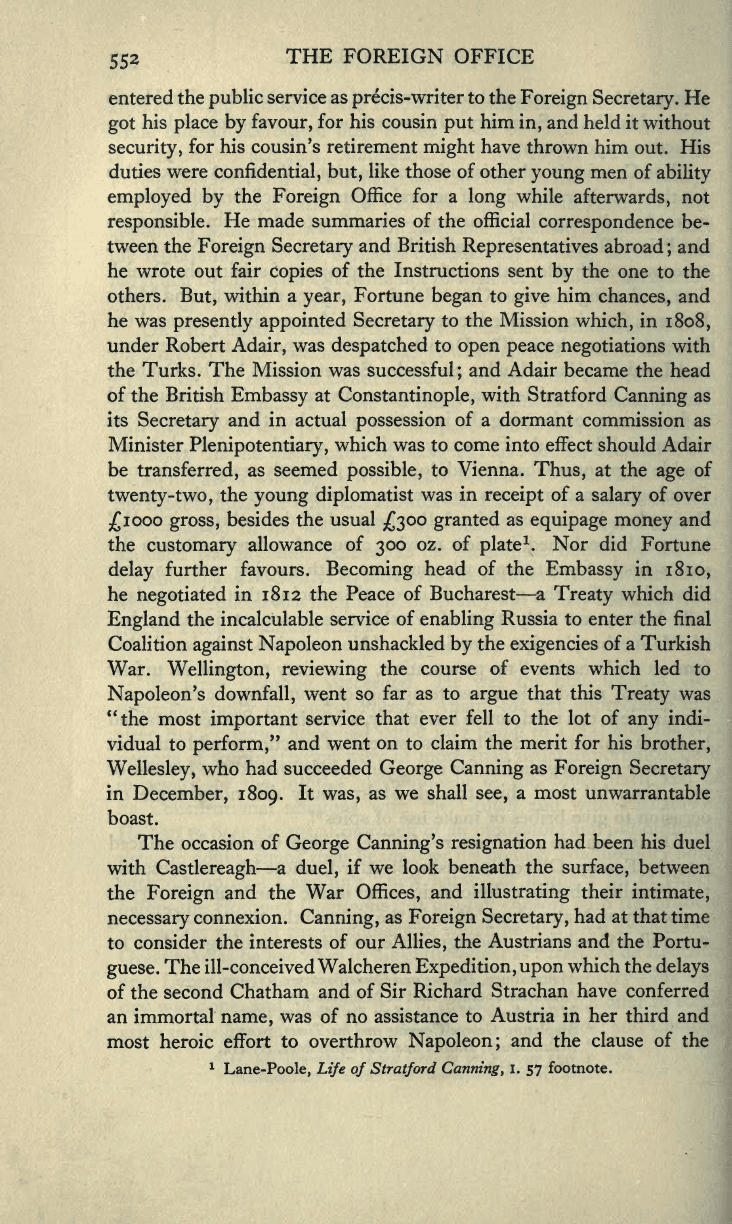
552
THE
FOREIGN
OFFICE
entered
the
public
service
as
precis-writer
to
the
Foreign Secretary.
He
got
his
place
by
favour,
for
his
cousin
put
him
in,
and
held it
without
security,
for his cousin's
retirement
might
have
thrown him
out.
His
duties
were
confidential, but,
like those of
other
young
men of
ability
employed by
the
Foreign
Office for a
long
while
afterwards,
not
responsible.
He
made summaries of
the official
correspondence
be-
tween
the
Foreign Secretary
and
British
Representatives
abroad
;
and
he
wrote
out fair
copies
of
the
Instructions
sent
by
the
one
to the
others.
But,
within
a
year,
Fortune
began
to
give
him
chances,
and
he was
presently
appointed Secretary
to the Mission
which,
in
1808,
under Robert
Adair,
was
despatched
to
open peace
negotiations
with
the
Turks. The Mission was
successful;
and
Adair
became the head
of
the
British
Embassy
at
Constantinople,
with Stratford
Canning
as
its
Secretary
and in
actual
possession
of a
dormant
commission as
Minister
Plenipotentiary,
which was to come
into effect should Adair
be
transferred,
as
seemed
possible,
to
Vienna.
Thus,
at
the
age
of
twenty-
two,
the
young
diplomatist
was
in
receipt
of
a
salary
of over
£1000 gross,
besides
the
usual
£300
granted
as
equipage money
and
the
customary
allowance
of
300
oz. of
plate
1
.
Nor did
Fortune
delay
further
favours.
Becoming
head
of
the
Embassy
in
18
10,
he
negotiated
in 1812 the
Peace
of Bucharest
—
a
Treaty
which did
England
the
incalculable service
of
enabling
Russia to
enter
the
final
Coalition
against
Napoleon
unshackled
by
the
exigencies
of a
Turkish
War.
Wellington,
reviewing
the
course of
events
which
led
to
Napoleon's
downfall,
went
so
far as to
argue
that
this
Treaty
was
"the
most
important
service
that
ever fell
to the
lot of
any
indi-
vidual to
perform,"
and went
on
to
claim
the
merit for his
brother,
Wellesley,
who
had succeeded
George
Canning
as
Foreign
Secretary
in
December,
1809.
It
was,
as
we
shall
see,
a most
unwarrantable
boast.
The occasion
of
George
Canning's
resignation
had been
his duel
with
Castlereagh
—
a
duel,
if we look
beneath the
surface,
between
the
Foreign
and
the
War
Offices,
and
illustrating
their
intimate,
necessary
connexion.
Canning,
as
Foreign
Secretary,
had at that
time
to
consider
the
interests
of our
Allies,
the
Austrians
and
the
Portu-
guese.
The
ill-conceived
Walcheren
Expedition,
upon
which
the
delays
of
the
second
Chatham
and of
Sir Richard
Strachan
have
conferred
an immortal
name,
was of no
assistance
to
Austria
in her
third
and
most
heroic
effort
to overthrow
Napoleon;
and
the
clause
of
the
1
Lane-Poole,
Life
of Stratford
Canning,
1.
57
footnote.
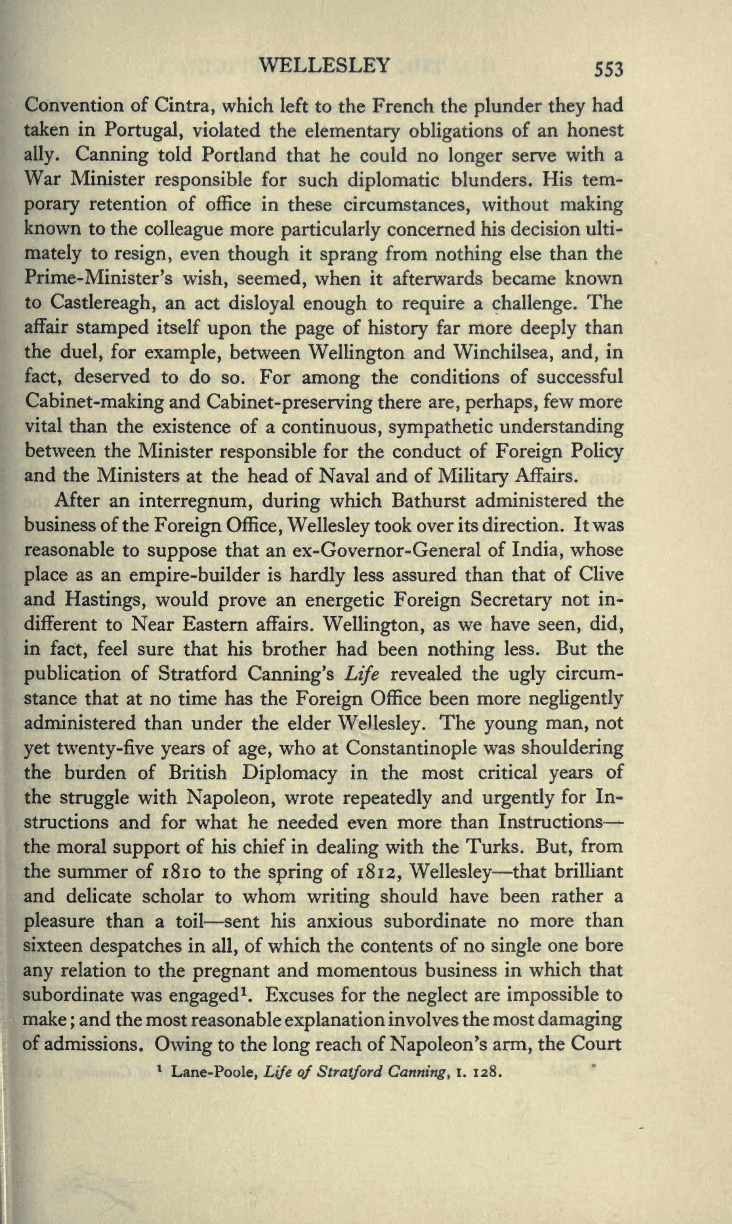
WELLESLEY
553
Convention of
Cintra,
which
left
to
the
French the
plunder
they
had
taken in
Portugal,
violated
the
elementary obligations
of
an honest
ally.
Canning
told
Portland
that he could
no
longer
serve
with
a
War
Minister
responsible
for such
diplomatic
blunders.
His
tem-
porary
retention
of
office in
these
circumstances,
without
making
known
to
the
colleague
more
particularly
concerned
his decision
ulti-
mately
to
resign,
even
though
it
sprang
from
nothing
else
than
the
Prime-Minister's
wish, seemed,
when
it
afterwards
became
known
to
Castlereagh,
an
act
disloyal enough
to
require
a
challenge.
The
affair
stamped
itself
upon
the
page
of
history
far
more
deeply
than
the
duel,
for
example,
between
Wellington
and
Winchilsea, and,
in
fact,
deserved
to do
so. For
among
the
conditions
of
successful
Cabinet-making
and
Cabinet-preserving
there
are,
perhaps,
few more
vital
than
the
existence
of a
continuous,
sympathetic
understanding
between
the
Minister
responsible
for
the
conduct of
Foreign
Policy
and
the
Ministers
at the head
of
Naval and of
Military
Affairs.
After an
interregnum,
during
which Bathurst
administered
the
business of
the
Foreign
Office,
Wellesley
took over its
direction. It
was
reasonable
to
suppose
that
an
ex-Governor-
General of
India,
whose
place
as an
empire-builder
is
hardly
less assured than
that
of Clive
and
Hastings,
would
prove
an
energetic
Foreign
Secretary
not
in-
different to Near
Eastern
affairs.
Wellington,
as we have
seen,
did,
in
fact,
feel sure
that
his
brother
had
been
nothing
less.
But
the
publication
of
Stratford
Canning's
Life
revealed the
ugly
circum-
stance
that at no
time
has
the
Foreign
Office been
more
negligently
administered than under
the
elder
Wellesley.
The
young
man,
not
yet
twenty-five
years
of
age,
who at
Constantinople
was
shouldering
the burden of
British
Diplomacy
in
the most
critical
years
of
the
struggle
with
Napoleon,
wrote
repeatedly
and
urgently
for
In-
structions
and for
what
he needed even more than
Instructions
—
the
moral
support
of
his
chief
in
dealing
with the
Turks.
But,
from
the
summer of
18
10
to the
spring
of
18
12,
Wellesley
—
that
brilliant
and
delicate
scholar
to
whom
writing
should have
been rather
a
pleasure
than a
toil
—
sent
his
anxious subordinate
no
more than
sixteen
despatches
in
all,
of
which
the contents
of no
single
one bore
any
relation to
the
pregnant
and
momentous
business
in which
that
subordinate
was
engaged
1
.
Excuses for
the
neglect
are
impossible
to
make
;
and
the most
reasonable
explanation
involves the
most
damaging
of
admissions.
Owing
to the
long
reach
of
Napoleon's
arm,
the
Court
1
Lane-Poole,
Life
of
Stratford
Canning
,
I.
128.
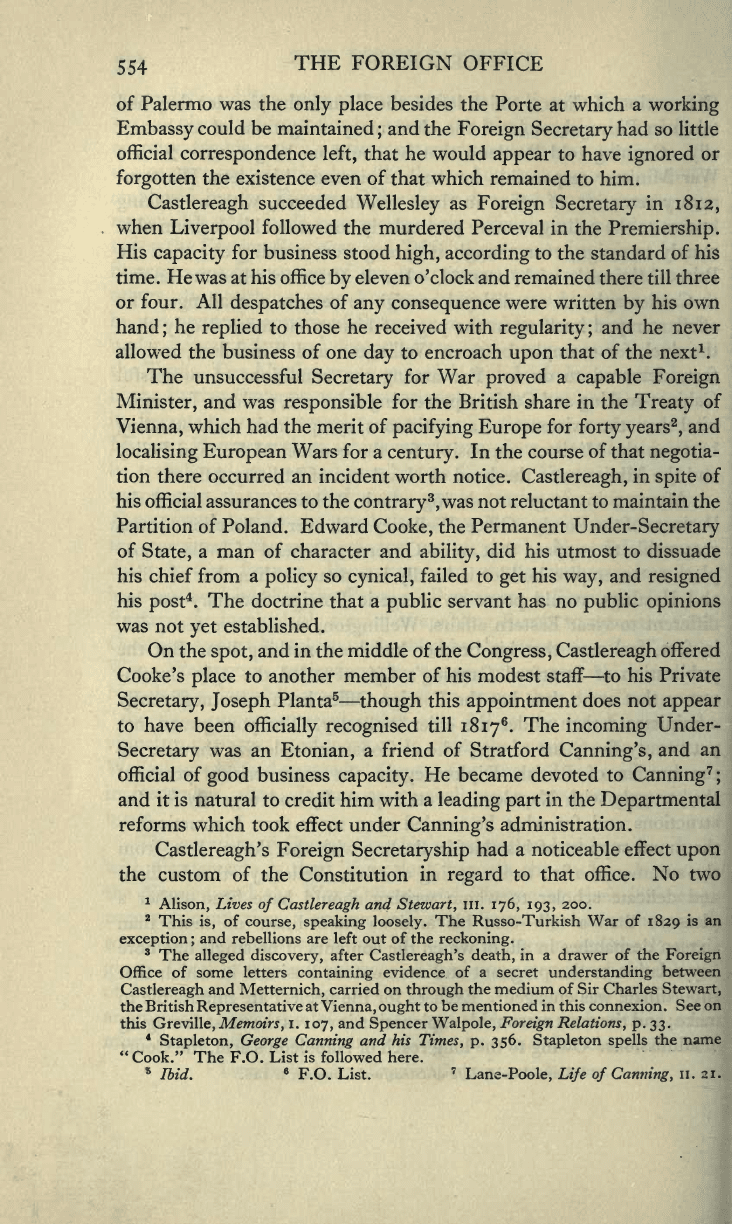
554
THE FOREIGN
OFFICE
of Palermo
was
the
only place
besides the
Porte at
which
a
working
Embassy
could be
maintained
;
and
the
Foreign
Secretary
had so
little
official
correspondence
left,
that
he would
appear
to
have
ignored
or
forgotten
the
existence even of
that
which remained
to
him.
Castlereagh
succeeded
Wellesley
as
Foreign
Secretary
in
1812,
when
Liverpool
followed
the murdered Perceval in
the
Premiership.
His
capacity
for
business
stood
high,
according
to
the standard
of
his
time. Hewas at
his
office
by
eleven
o'clock and
remained
there till three
or four. All
despatches
of
any
consequence
were
written
by
his own
hand
;
he
replied
to those
he
received
with
regularity
;
and he never
allowed the business of
one
day
to
encroach
upon
that
of
the
next
1
.
The
unsuccessful
Secretary
for War
proved
a
capable Foreign
Minister,
and was
responsible
for
the
British share
in
the
Treaty
of
Vienna,
which
had
the
merit
of
pacifying Europe
for
forty years
2
,
and
localising European
Wars for a
century.
In
the
course
of
that
negotia-
tion there
occurred
an
incident worth notice.
Castlereagh,
in
spite
of
his official
assurances
to
the
contrary
3
,
was not reluctant to maintain the
Partition of Poland. Edward
Cooke,
the
Permanent
Under-Secretary
of
State,
a man of
character
and
ability,
did his
utmost
to dissuade
his chief
from
a
policy
so
cynical,
failed to
get
his
way,
and
resigned
his
post
4
. The
doctrine that
a
public
servant
has no
public
opinions
was not
yet
established.
On
the
spot,
and in
the
middle of
the
Congress,
Castlereagh
offered
Cooke's
place
to another member of
his
modest staff
—
to
his
Private
Secretary,
Joseph
Planta
5
—
though
this
appointment
does not
appear
to
have been
officially
recognised
till
1817
6
.
The
incoming
Under-
Secretary
was an
Etonian,
a friend of
Stratford
Canning's,
and
an
official of
good
business
capacity.
He
became devoted
to
Canning
7
;
and it
is
natural
to credit
him
with
a
leading part
in
the
Departmental
reforms which took
effect
under
Canning's
administration.
Castlereagh's
Foreign
Secretaryship
had
a
noticeable effect
upon
the
custom
of
the Constitution
in
regard
to that office.
No two
1
Alison,
Lives
of Castlereagh
and
Stewart,
in.
176, 193,
200.
2
This
is,
of
course,
speaking loosely.
The
Russo-Turkish
War of
1829
is
an
exception;
and
rebellions are left
out
of the
reckoning.
3
The
alleged
discovery,
after
Castlereagh's
death,
in a
drawer of the
Foreign
Office
of some letters
containing
evidence
of a secret
understanding
between
Castlereagh
and
Metternich,
carried on
through
the
medium
of Sir Charles
Stewart,
the British
Representative
at
Vienna,
ought
to
be mentioned in this connexion.
See
on
this
Greville,
Memoirs,
1.
107,
and
Spencer
Walpole,
Foreign
Relations,
p. 33.
4
Stapleton,
George
Canning
and
his
Times,
p. 356. Stapleton
spells
the
name
"
Cook." The F.O. List
is followed here.
5
Ibid.
6
F.O. List.
7
Lane-Poole,
Life of
Canning,
11. 21.
